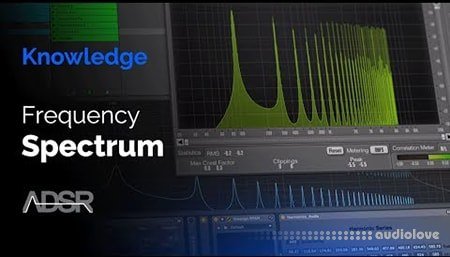ADSR Sounds The Frequency Spectrum [TUTORiAL]

FANTASTiC | 16 August 2018 | 209 MB
A basic knowledge of the frequency spectrum, how it is constructed and represented in your DAWs will set you up to manipulate and understand how sound and digital audio work.
The skills taught in this course are fundamental for anyone wanting to make electronic music. If you’ve got the passion but maybe lack the background, get started with this foundation course on the frequency spectrum now!
Course Overview
This course will explore the fundamentals of sound and the frequency spectrum before moving onto to some essential digital audio theory.
Topics that will be covered:
These areas are essential to understand for all areas of audio production:
► What is Sound. Frequency & Hearing
In these first few videos we will look at the properties of a waveform. These properties represent, in graphical form, sound pressure or voltage level as it evolves over time.
► Wavelength, Amplitude, Phase
Wavelength is the distance between two adjacent points on a waveform. Wavelength and frequency are linked; the lower the frequency or pitch, the longer the wavelength and period, the higher the frequency or pitch and the shorter the wavelength and period.
Amplitude is a measure of the amount of particle displacement in a medium. The more energy you impart the further the particles will travel from their initial resting position. The greater the energy the greater the amplitude and the more intense the sound wave will be.
Phase is used to describe a specific position on the waveform, which is measured in degrees. Most of the sounds we work with are harmonic. They are made up of repeating cyclic waveforms, unless they are some form of noise. We can therefore manipulate and control phase.
► The Harmonic Series
Understanding the harmonic series is essential to understand and do proper synthesis, sound design, mixing and mastering. It allows us to analyse, construct and destruct the sounds we wish to work with.
► Creating sounds by analysing the harmonic series
Using our knowledge of the harmonic series and the tools we use to analyse it can be a very powerful ability in synthesis and mixing. In this video we will construct a basic sound using analysis and additive synthesis.
► Digital Audio Sample Rates
In the next couple of videos we will discuss the basics of digital audio, what you need to know in order get a good representation of a signal. Sample rates, quantisation & bit resolution, aliasing, dither, what’s it all about and why it matters. This video will focus on the conversion process and sample rates.
► Digital Audio Bit Resolution
Continuing on from the previous video, here we will discuss quantisation and bit resolution what they mean and why they are important.
home page
The skills taught in this course are fundamental for anyone wanting to make electronic music. If you’ve got the passion but maybe lack the background, get started with this foundation course on the frequency spectrum now!
Course Overview
This course will explore the fundamentals of sound and the frequency spectrum before moving onto to some essential digital audio theory.
Topics that will be covered:
- The basics of sound – Amplitude, frequency, phase, harmonic content, dBs.
- Harmonic theory – Fundamental frequency, Harmonics, partials.
- Sampling Theory – Sample rates, Bit resolution
- Dither
These areas are essential to understand for all areas of audio production:
- Synthesis
- Sound Design
- Mixing
- Mastering
► What is Sound. Frequency & Hearing
In these first few videos we will look at the properties of a waveform. These properties represent, in graphical form, sound pressure or voltage level as it evolves over time.
► Wavelength, Amplitude, Phase
Wavelength is the distance between two adjacent points on a waveform. Wavelength and frequency are linked; the lower the frequency or pitch, the longer the wavelength and period, the higher the frequency or pitch and the shorter the wavelength and period.
Amplitude is a measure of the amount of particle displacement in a medium. The more energy you impart the further the particles will travel from their initial resting position. The greater the energy the greater the amplitude and the more intense the sound wave will be.
Phase is used to describe a specific position on the waveform, which is measured in degrees. Most of the sounds we work with are harmonic. They are made up of repeating cyclic waveforms, unless they are some form of noise. We can therefore manipulate and control phase.
► The Harmonic Series
Understanding the harmonic series is essential to understand and do proper synthesis, sound design, mixing and mastering. It allows us to analyse, construct and destruct the sounds we wish to work with.
► Creating sounds by analysing the harmonic series
Using our knowledge of the harmonic series and the tools we use to analyse it can be a very powerful ability in synthesis and mixing. In this video we will construct a basic sound using analysis and additive synthesis.
► Digital Audio Sample Rates
In the next couple of videos we will discuss the basics of digital audio, what you need to know in order get a good representation of a signal. Sample rates, quantisation & bit resolution, aliasing, dither, what’s it all about and why it matters. This video will focus on the conversion process and sample rates.
► Digital Audio Bit Resolution
Continuing on from the previous video, here we will discuss quantisation and bit resolution what they mean and why they are important.
home page
Only registered users can see Download Links. Please or login.


No comments yet